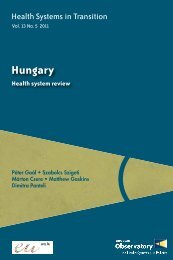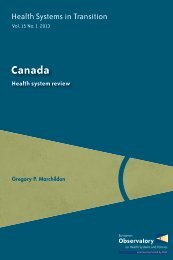Review of Current Evidence and Comparison of Guidelines for ...
Review of Current Evidence and Comparison of Guidelines for ...
Review of Current Evidence and Comparison of Guidelines for ...
You also want an ePaper? Increase the reach of your titles
YUMPU automatically turns print PDFs into web optimized ePapers that Google loves.
Epidemiological Treatment <strong>of</strong> Contacts<br />
EUR/03/5045931<br />
page 11<br />
There is widespread agreement that all patients with syphilis should have contact tracing<br />
per<strong>for</strong>med. The question <strong>of</strong> whether to treat an asymptomatic contact or to wait <strong>for</strong> signs is more<br />
difficult. The stage <strong>of</strong> disease <strong>of</strong> the patient with syphilis is important as some stages are much<br />
more infectious, i.e. secondary than others. CDC guidelines recommend presumptive treatment<br />
(i.e. one dose BBP) <strong>for</strong> contacts within the last 90 days. The United Kingdom guidelines<br />
recommend BBP single 2.4 MU dose or doxycycline 100 mg bd <strong>for</strong> 14 days. Azithromycin 1 g<br />
stat is second line. The European guidelines do not recommend routine treatment. A recent study<br />
in the United States revealed that azithromycin might be efficacious in treating incubating<br />
syphilis (51). In Russian Federation all patients with sexual or close domestic contact with a<br />
syphilis-infected person in the last two months are treated. Regimes are one dose <strong>of</strong> BBP, two<br />
doses <strong>of</strong> bicillin-3 (1.8 million units/dose), or bicillin-5 (1.5 million units/ dose). Alternatives are<br />
PBP (1 million units/day <strong>for</strong> seven days) or NBP (600 000 units/twice a day <strong>for</strong> seven days).<br />
Potential infections through blood transfusion in the last three months are also treated in this<br />
manner.<br />
Conclusions<br />
The purpose <strong>of</strong> this paper was to compare the differences in international treatment regimes <strong>for</strong><br />
syphilis in Europe. WHO estimates that around 11 million new cases <strong>of</strong> syphilis are occurring<br />
worldwide every year (8), with the bulk <strong>of</strong> these occurring in South-East Asia (4m) <strong>and</strong> Sub-<br />
Saharan Africa (3.8m), in the WHO European Region much higher syphilis rates are observed in<br />
eastern Europe <strong>and</strong> central Asia than in western or central Europe (115–118). While parenteral<br />
penicillin based regimes are highly effective, parenteral regimes are not ideal <strong>for</strong> use in many<br />
settings. There is still a lack <strong>of</strong> evidence to identify <strong>and</strong> build consensus on the most appropriate<br />
regimes <strong>for</strong> different stages <strong>of</strong> disease. With the advent <strong>of</strong> HIV infection, <strong>and</strong> the mobility <strong>of</strong><br />
population groups leading to increasing levels <strong>of</strong> syphilis in many geographical regions, the need<br />
<strong>for</strong> effective treatment <strong>and</strong> harmonized treatment guidelines is greater than be<strong>for</strong>e.<br />
This review points to the need <strong>for</strong> <strong>for</strong>mal comparative clinical trials <strong>of</strong> syphilis treatment. While<br />
many <strong>of</strong> the guidelines are based on the same clinical evidence, the differing conclusions drawn<br />
by experts from different geographical regions highlight this need. The report has highlighted<br />
some <strong>of</strong> the areas <strong>of</strong> disagreement, which may be important to study in the future. These include<br />
comparisons <strong>of</strong> different penicillins, penicillin alternatives, parenteral vs. oral treatments, <strong>and</strong><br />
comparison <strong>of</strong> dose <strong>and</strong> duration <strong>for</strong> maximum efficacy with minimal drug use.<br />
It is unlikely that the pharmaceutical industry can be expected to deliver these studies. Control <strong>of</strong><br />
syphilis should be considered a public good <strong>and</strong> public resources need to be found to take<br />
<strong>for</strong>ward the necessary research. Logistical problems in conducting clinical trials, which arise<br />
from inadequate numbers <strong>of</strong> cases occurring in those countries where the bulk <strong>of</strong> the worldwide<br />
clinical research ef<strong>for</strong>t is carried out could be overcome by supporting the development <strong>of</strong> trials<br />
in countries which have high incidence, but also the technical infrastructure to conduct these –<br />
such as some countries <strong>of</strong> the newly independent states. Further basic research, particularly in<br />
relation to developing better <strong>and</strong> more rapidly measurable outcome measures <strong>for</strong> treatment,<br />
would considerably facilitate the conduct <strong>of</strong> such trials.

















